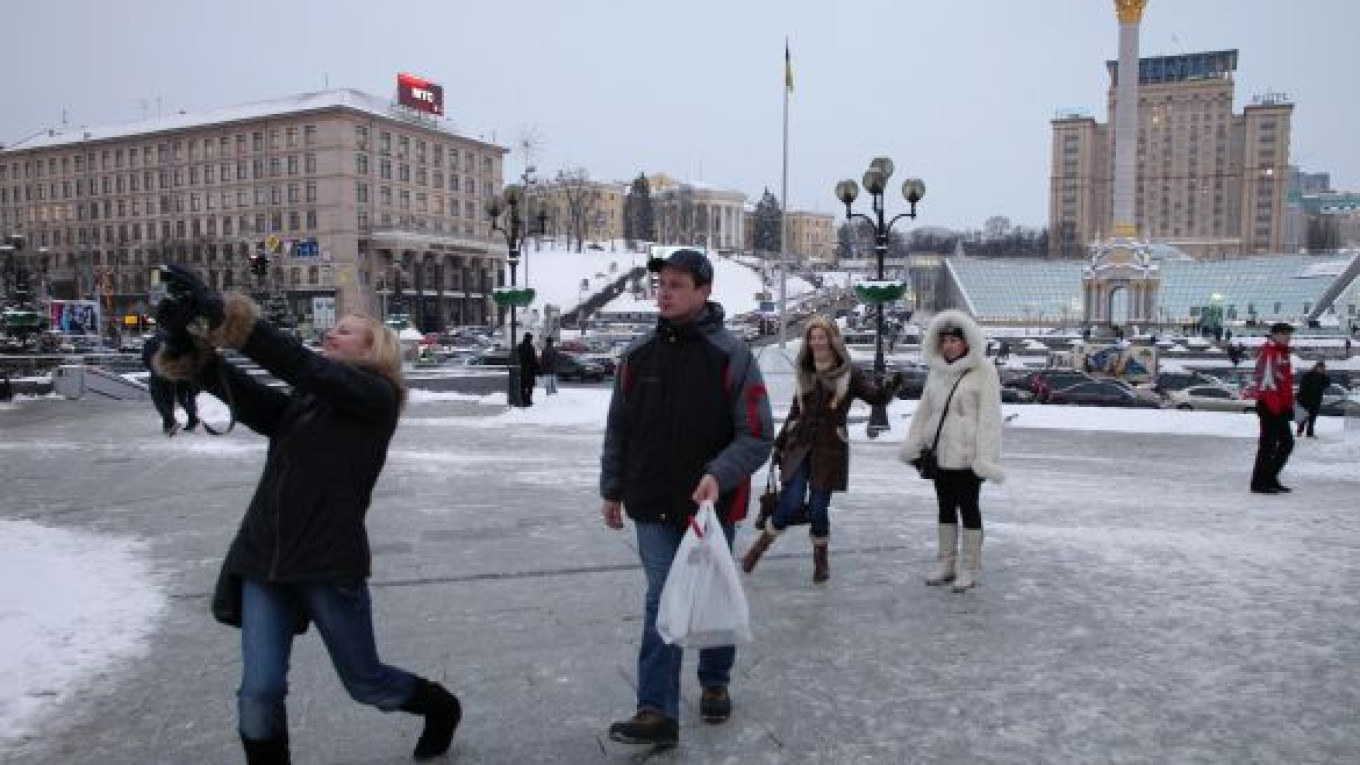President Dmitry Medvedev on Tuesday offered cautious congratulations to Viktor Yanukovych on his win over Yulia Tymoshenko in the Ukrainian presidential elections, becoming the first foreign leader to weigh in on the close runoff.
The announcement was followed by statements from the Foreign Ministry and the Russian Orthodox Church, but other countries appeared to be waiting for an outcome to an expected legal challenge before offering their congratulations.
International observers have called the vote free and fair.
"Dmitry Medvedev congratulated Viktor Yanukovych on the completion of the election campaign, which was highly evaluated by international observers, and on the success he achieved in the presidential elections," the presidential press service said in a statement.
Medvedev and Yanukovych spoke by phone Tuesday, the service said, without elaborating.
The brevity of the statement and its delicate phrasing — avoiding the word "victory" — appeared to be an attempt to head off criticism that Moscow was trying to declare a winner before the final results are announced Feb. 17.
Tymoshenko's supporters said Tuesday that they would contest the vote — which Yanukovych won by just less than 3.5 percent — in court, alleging that there were widespread violations during vote counting at more than 1,000 stations. But her camp appears to have backed off Tymoshenko's threat last week to take to the streets if the vote looked unfair.
Curiously, the Kremlin's statement appeared just hours after State Duma Speaker Boris Gryzlov told reporters in Moscow that Yanukovych should be congratulated only after his inauguration.
Gryzlov, a top official in United Russia, referred to then-President Vladimir Putin's premature congratulation of Yanukovych — already widely seen as a pro-Moscow candidate — on his win in Ukraine's fraud-tainted 2004 presidential election.
That show of support eventually became a major diplomatic blunder for Putin, who had actively campaigned for Yanukovych, and pro-democracy activists used the move to rally supporters for the protests that became known as the Orange Revolution. The Supreme Court eventually overturned the results, and Yanukovych lost a second vote in early 2005 to the Western-backed protest leader, Viktor Yushchenko.
Of all Russian politicians, the flamboyant leader of the Liberal Democratic Party, Vladimir Zhirinovsky, was the first to congratulate Yanukovych, releasing a statement several hours before the Kremlin.
He also sent a consolation letter to Tymoshenko.
Patriarch Kirill, leader of the Russian Orthodox Church, congratulated Yanukovych shortly after Medvedev in a statement that lacked the Kremlin's caution.
"I cordially congratulate you on your victory in the presidential elections," Kirill wrote in a statement distributed by his press service. He praised Yanukovych for having the talent and experience to justify the trust placed in him.
Most Orthodox parishes in Ukraine follow the Moscow Patriarchate, which is headed by Kirill. Yushchenko, in an attempt to build an independent Ukrainian national identity, has been backing the autonomous Ukrainian Orthodox Church, drawing strong criticism from Kirill and Russian officials.
Last year, Kirill toured Ukraine in a lengthy ministerial trip aimed at stressing church unity in the world's two biggest Eastern Orthodox countries.
The Foreign Ministry said in a statement that the election met international observers' standards and that Moscow was counting on developing relations with the new Ukrainian leadership. The statement did not mention Yanukovych or Tymoshenko by name.
Tymoshenko, the current prime minister, has collected 45.47 percent of the vote, winning in Ukraine's western and northern provinces, according to data from the Central Election Commission, with 99.98 percent of the ballots counted.
Yanukovych, a former prime minister who leads the Party of the Regions, which has the biggest faction in the Ukrainian parliament, grabbed 48.96 percent, carrying the eastern and southern regions of the country that border Russia.
More than 1.1 million voters — 4.36 percent — voted against both candidates in the second round.
Tymoshenko canceled two public statements on the results Monday, and her camp said she would only read a statement at a news conference called for Tuesday.
Her allies said, however, that her party would turn to the courts to demand a recount at the polling stations where they claim that the results were marred by fraud.
Itar-Tass and the Ukrainskaya Pravda news portal quoted Tymoshenko as saying she would "never recognize" the legitimacy of the runoff vote and would demand a the third round of the elections.
Meanwhile, legal grounds for such a strategy would be flimsy, after international monitors, including those from Russia, Western Europe and the United States, praised the vote as being free and fair and called for political leaders in Ukraine to accept the result.
A Message from The Moscow Times:
Dear readers,
We are facing unprecedented challenges. Russia's Prosecutor General's Office has designated The Moscow Times as an "undesirable" organization, criminalizing our work and putting our staff at risk of prosecution. This follows our earlier unjust labeling as a "foreign agent."
These actions are direct attempts to silence independent journalism in Russia. The authorities claim our work "discredits the decisions of the Russian leadership." We see things differently: we strive to provide accurate, unbiased reporting on Russia.
We, the journalists of The Moscow Times, refuse to be silenced. But to continue our work, we need your help.
Your support, no matter how small, makes a world of difference. If you can, please support us monthly starting from just $2. It's quick to set up, and every contribution makes a significant impact.
By supporting The Moscow Times, you're defending open, independent journalism in the face of repression. Thank you for standing with us.
Remind me later.


